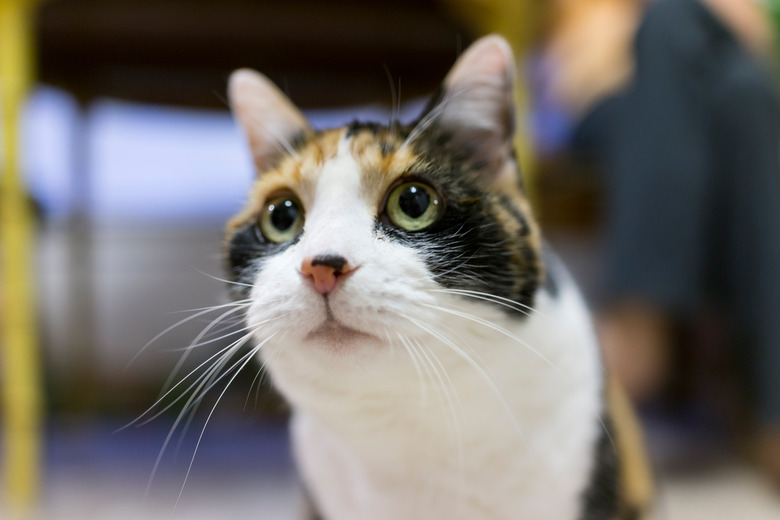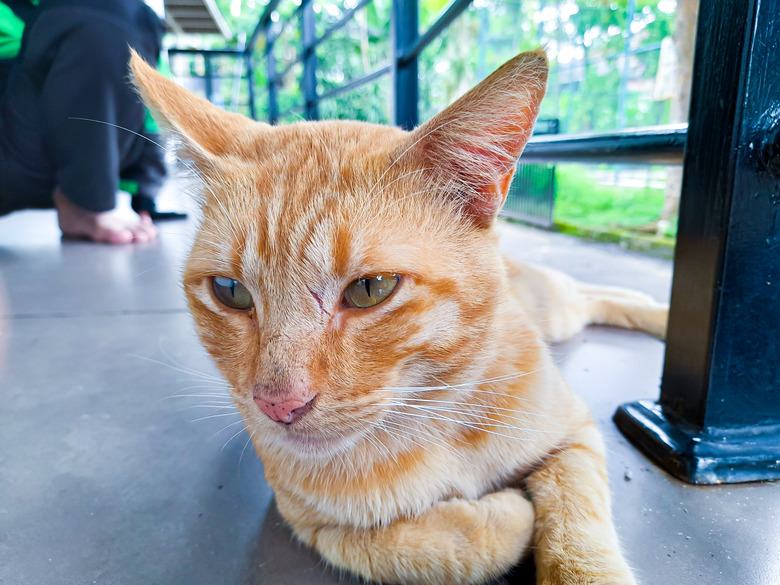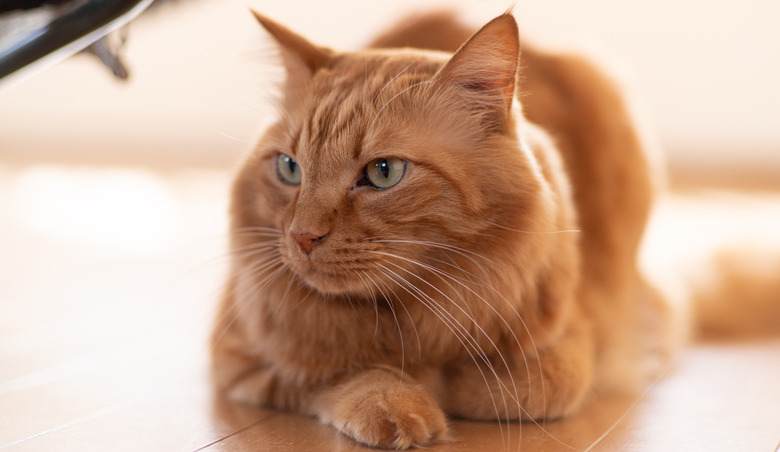Cat Dilated Eye: What Does It Mean When A Cat's Pupils Are Dilated?
You know that a slow blink from your cat means, "I love you. I'm content. I'm feeling good right now." But that's body language, and parts of their eyes can be affected by physical factors too, like the widening or narrowing of the pupils.
Why are my cat’s eyes dilated?
Why are my cat's eyes dilated?
The brightness of their surroundings is the most common cause for a change in pupil size, and it's nothing to worry about. The pupils are those dark spots at the center of the cat's eyes, technically in the middle of their irises. A cat's pupils will shrink when there's a lot of bright light, and they should dilate, or widen, in low light. Dilation is a normal biological response to the amount of light present, though other things can cause changes to your feline's pupils as well.
The key word with dilated cat pupils is "always." Occasional dilation can be prompted by a number of emotional or environmental factors or even by age. You'll want to rule these out before becoming alarmed. If you turn up the lights, your cat's pupils should constrict.
Keep in mind that cats can see in a light one-fifth of the level that humans need for clear perception. They don't need a lot of light to see well. Look for another innocuous cause if the pupils don't narrow. It could be that your cat is just feeling mellow. Wide pupils are often relaxed pupils, but unfortunately, the opposite can also be true.
How dilated cat eyes can signal health problems
How dilated cat eyes can signal health problems
It can be a bit like putting together a puzzle, so take stock of their surroundings and what's going on at the time. You know your cat better than anyone, so size up their body language to try to get to the cause. Are they aroused for some reason and throwing off signs of excitement or anger?
If so, the cat's pupils might dilate. Think of it this way: If something startles or scares you, don't your own eyes pop open wide? Try tossing a new toy or object on the floor. Technically, this could be a cat monster, something not to be trusted until it's been completely and warily investigated and, if necessary, rendered dead. Their pupils might dilate at the new, interesting, possibly dangerous intrusion and then narrow again after they've sized up the situation.
If your cat has dilated pupils, the cause might be a physical injury that your cat is trying to hide. Pain in the eyes themselves usually results in narrowing of a cat's pupils, while pain in the body in general can result in dilated pupils. Also, squinted eyes or bloodshot eyes are indicators of pain in cats.
Dilated pupils and cat behavior
Dilated pupils and cat behavior
If your cat is hyper by nature, their pupils are probably dilated more often than not. Younger cats are more prone to dilated pupils caused by excitement than more relaxed older cats.
The key here is timing. What you're looking for more than anything are changes to a cat's pupils. If a cat's eyes are dilated all the time, the situation might require a visit to the veterinarian to determine your pet's health condition.
Cat eyes and hypertension
Cat eyes and hypertension
Hypertension, commonly referred to as high blood pressure, is a very common physiological culprit of dilated pupils. High blood pressure can be either a primary or secondary condition.
Secondary means that it's caused by another ailment or illness. Hypertension can be the result of hyperthyroidism or kidney disease, also called kidney failure. Your veterinarian might shine a light into your cat's eyes to see how their pupils react as a preliminary step toward arriving at a diagnosis.
Your cat will probably exhibit other symptoms as well if they are suffering from high blood pressure. They might not be grooming themselves as fastidiously, or maybe they have gained or lost a few pounds. A decreased interest in food or water can be another sign.
Anisocoria and large pupils in cats
Anisocoria and large pupils in cats
Compare your cat's left eye to their right. Are both pupils the same size or different sizes? A disorder known as anisocoria can cause a difference. This is technically not a condition but rather a symptom. Underlying causes include retinal disease, feline leukemia, cancer, or an injury or eye ulcer. The injury doesn't have to be recent. Scar tissue can cause anisocoria too.
You might also notice odd color changes to the other parts of their eyes. Depending on the cause, your cat might rub their eyes a lot or seem lethargic. A visit to the veterinarian immediately is recommended to determine a cat's wellness.
Dysautonomia and cat nerves
Dysautonomia and cat nerves
Cats with round pupils might also suffer from dysautonomia, sometimes called Key-Gaskell Syndrome. This involves your cat's autonomic nervous system, or ANS, which is responsible for prompting all those physiological things your cat doesn't willfully control: hunger or lack of it, heart rate, blood pressure, respiration, and pupil dilation.
You might notice other symptoms of dysautonomia too if this is the cause of their dilated pupils. The most obvious are difficulties with urinating or defecating or diarrhea. The cat's reflexes might seem off, and their nose might feel unnaturally dry to the touch. Vomiting is a symptom, and so are weight loss, coughing, and lethargy. For cats with round pupils, you'll want to visit the veterinarian as soon as possible.
Veterinarian care for a cat's dilated pupils
Veterinarian care for a cat's dilated pupils
Blood and urine samples can tell your veterinarian a lot about your cat's health no matter the physiological cause of your cat's wide pupils. If it is hypertension caused by another issue, your veterinarian will treat the underlying disease, no doubt extending your feline's life and all because you noticed something strange was going on with their eyes. Primary hypertension can be treated and controlled with daily medication.
Anisocoria demands immediate medical care because the underlying condition can be very serious. Again, your veterinarian will have to investigate, do some tests, narrow down the cause, and treat the cause, not the symptom. Not acting quickly enough can mean damage to your cat's vision or worse. It's generally not reversible if your cat has lost their vision, but many blind cats continue to get around easily.
The bottom line
The bottom line
Even if your feline isn't exhibiting any other symptoms but they just walk around with dilated eyes all the time, you'll want to have the situation checked out. In most cases, constant dilation indicates an underlying medical condition. Occasional dilation is normally just the result of a cat's interesting life or response to dim light. It's possible that your feline's often-dilated pupils are prompted by their personality, but you won't know this until your veterinarian tells you for sure. Dilated pupils in a cat can be a symptom of pain, hypertension or dysautonomia, an autonomic nervous system disorder, kidney failure, or another health issue.


